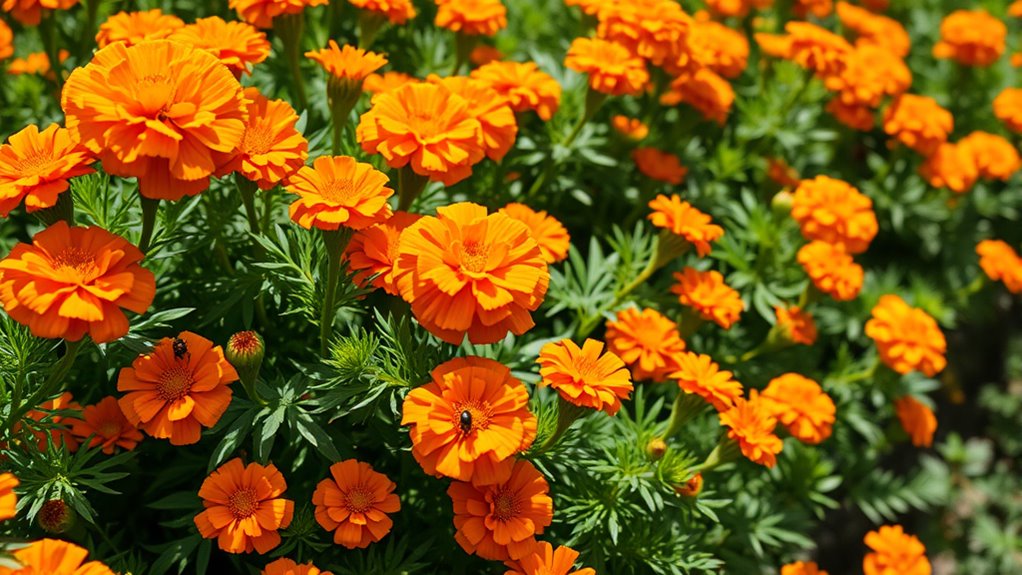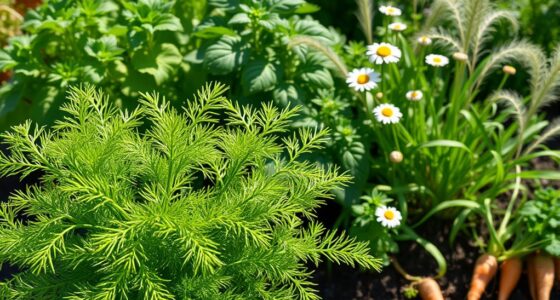Marigolds are a fantastic natural pest control solution for your garden. Their strong scent repels nematodes, aphids, and whiteflies, creating a natural barrier alongside your vegetables. They also attract beneficial insects, support biodiversity, and help you detect pest problems early through their bright blooms. By planting marigolds, you can reduce chemical use and promote a healthier, more resilient garden. Keep exploring to discover how to maximize their benefits and make a pest-free garden naturally.
Key Takeaways
- Marigolds repel pests like nematodes, aphids, and whiteflies with their strong scent, protecting nearby vegetables.
- They serve as natural barriers and visual indicators for early pest detection, enabling timely intervention.
- Companion planting marigolds with vegetables helps reduce reliance on chemical pesticides and promotes biodiversity.
- Combining marigolds with organic pest control methods enhances overall plant health and yields sustainably.
- Marigolds enrich soil, attract beneficial insects, and support a resilient, eco-friendly garden ecosystem.

Are you tired of relying on chemical pesticides that harm the environment and your health? If so, it’s time to explore natural pest control methods that are safe, effective, and eco-friendly. One of the simplest yet most powerful techniques is companion planting, where you strategically grow certain plants together to repel pests and attract beneficial insects. Marigolds are a prime example; their strong scent deters nematodes, aphids, and whiteflies. By planting marigolds alongside vegetables like tomatoes, peppers, or beans, you create a natural barrier that keeps pests at bay without resorting to harmful chemicals. This method not only protects your garden but also enriches the soil and encourages biodiversity.
Plant marigolds to naturally repel pests and boost garden health.
In addition to companion planting, organic sprays are a highly effective tool in your natural pest control arsenal. These sprays are made from plant-based ingredients like neem oil, garlic, or chili pepper extracts, which discourage pests without harming your plants or the environment. Applying organic sprays regularly can prevent infestations from taking hold, reducing the need for drastic measures later. When combined with companion planting, organic sprays form a holistic pest management system that’s both sustainable and safe for your family and pollinators like bees and butterflies. Furthermore, understanding the types of headphone jacks can help you choose the right audio equipment for your gardening podcasts or tutorials, enhancing your learning experience.
Marigolds also serve as a visual marker for pest problems, allowing you to quickly identify issues before they escalate. Their bright, cheerful blooms act as a natural warning system, alerting you to the presence of pests or disease. This early detection gives you the opportunity to intervene with targeted organic sprays or by removing affected plants, further minimizing chemical use. Over time, you’ll notice healthier plants, improved yields, and a more balanced garden ecosystem.
You don’t have to be a gardening expert to implement these strategies. Simply planting marigolds around your vegetables and using organic sprays when necessary can dramatically reduce pest problems. Plus, these methods promote a more vibrant, diverse garden that’s resilient against pests and diseases. The beauty of natural pest control lies in its simplicity and harmony with nature, allowing you to grow nutritious food without sacrificing the health of your soil, wildlife, or family. As you incorporate companion planting with marigolds and rely on organic sprays, you’ll discover a more satisfying, eco-conscious way to tend your garden—one that benefits everyone and everything involved.
Frequently Asked Questions
How Quickly Do Marigolds Repel Pests?
You’re wondering about pest deterrent speed and marigold effectiveness. Generally, marigolds start repelling pests within a few days of planting, making them a quick natural solution. Their scent confuses and deters insects like mosquitoes, nematodes, and aphids almost immediately, but full protection might take a week or so as the plants establish. Overall, marigolds offer a fast and reliable natural pest control option for your garden.
Are Marigolds Safe for Organic Vegetable Gardens?
Did you know that marigolds are a popular choice for organic gardens? Yes, they’re safe for your vegetable patches, making them excellent companion planting options. You can rely on them as natural pest deterrents without worrying about harmful chemicals. Their bright blooms not only attract beneficial insects but also keep pests away, helping your garden thrive organically. So, incorporating marigolds into your garden is a smart, safe move for pest control.
Can Marigolds Attract Beneficial Insects?
You’ll find that marigolds attract beneficial insects, making them excellent for companion planting. These insects help control pests naturally, acting as pest deterrents in your garden. By planting marigolds near your vegetables, you encourage pollinators and predatory insects that keep harmful bugs at bay. This natural method supports a healthy, balanced ecosystem in your garden, reducing the need for chemical pest control and promoting organic growth.
Do Marigolds Need Special Soil Conditions?
You wonder if marigolds need special soil conditions. Generally, they thrive in well-draining soil with average fertility, making soil requirements quite flexible. For planting tips, use soil that’s rich in organic matter and guarantee good drainage to prevent root rot. Marigolds adapt well to various soil types, but adding compost can boost growth. Keep the soil slightly moist and avoid overwatering for healthy, vibrant plants.
How Often Should Marigolds Be Planted for Pest Control?
Perfectly planned planting schedules make pest control practical and pretty. You should plant marigolds regularly, ideally every few weeks, to maintain a continuous companion planting partnership. This ensures a steady supply of pest-repelling marigolds, keeping pests at bay. By sticking to consistent planting cycles, you create a colorful, collaborative garden that naturally deters pests, making your garden healthier and happier without harmful chemicals.
Conclusion
By planting marigolds, you can naturally repel over 40 pests, including mosquitoes and aphids, saving you money and reducing chemical use. This easy addition to your garden not only beautifies your space but also offers a powerful pest-fighting tool. Imagine a garden where pests are kept at bay without harmful pesticides—that’s the magic of marigolds. So, next time you’re planning your garden, consider these vibrant flowers for a healthier, pest-free outdoor space.









